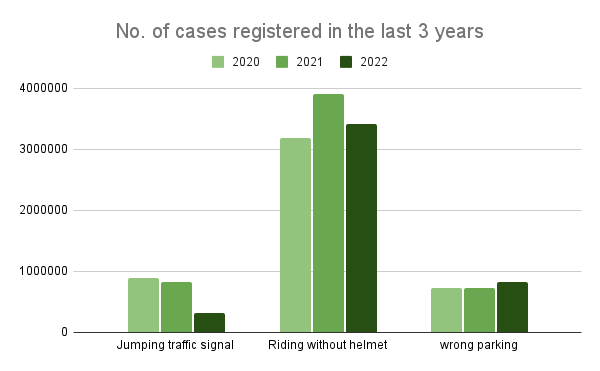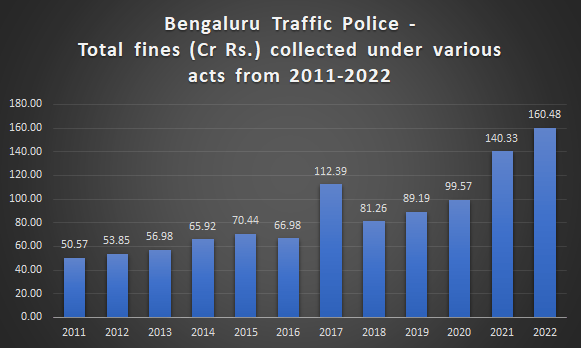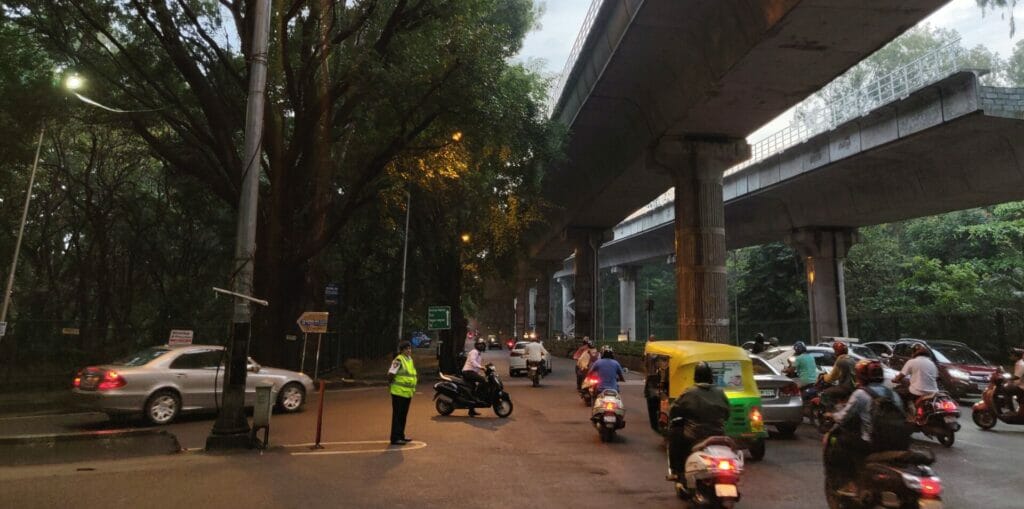Bengaluru’s traffic police have tried their hardest to curtail the city’s infamous traffic brawls and instances like speeding, drinking rashly, drunk driving or while on the phone by levying heavy traffic fines on the violators.
Bengaluru has always ranked higher in the state for having the most number of traffic violations, which have translated to increased penalties. There were also reports of a single traffic cop collecting as much as Rs 2 lakh in two hours from traffic violators.
How much amount has the government collected and what does it propose to do with all the fines they have raked in over the years?
Read more: Sustainable traffic solutions missing in campaign discourse as Bengaluru eyes one crore vehicles
Fines collected
The Bengaluru Traffic Police has collected Rs 141 crore in traffic fines as of the end of September 2022, out of which Rs 12.8 crore was collected through contactless payments and Rs 128 crore cash-based payments. As per reports, this amount has surpassed the annual collection of fines since 2019. Even amidst the partial lockdown in 2021, the numbers crossed the Rs 100 crore mark and over Rs 140 crore were collected from traffic violators.

As of 2022, the authorities have collected Rs 1.7 lakhs from commuters booked under the Karnataka Police Act and Rs 22,63,700 as towing charges with 2,682 and 3,334 cases registered, respectively. A total of 8,27,671 cases of wrong parking have been filed this year while 1,11,190 cases have been booked for footpath parking and 16,086 cases for parking at intersections.
Citizen Matters had also featured an article in 2020 on how citizens are reporting traffic violations. 2019 recorded the highest number of complaint uploads, with a 150% increase in the reporting of violations compared to 2018. In 2019, 72% of the complaints were resolved, the report mentioned.
According to the Bengaluru Traffic police, parking fines are levied when vehicles are parked within 20 metres or 100 metres on either side of the No-Parking signage.
Read more: PublicEye app: Citizen complaints of traffic violations rising sharply
Data over the years
A report in Citizen Matter’s OpenCity mentions exactly how much revenue the authorities have raked up in traffic fines over the years.

In 2019, the government issued a notification revising the penalties for traffic violations, including speeding, using mobile phones while riding or driving, and driving uninsured vehicles among others. These penalties ranged anywhere from Rs 500 to Rs 2,000 for subsequent offences.
The OpenCity report found while the collection witnessed a spike post the hike, the number of violations remained the same. “Even the pandemic did not seem to have had much of an effect, and 2021 saw a record number of violations being booked,” the report mentions. The number of cases booked under the Motor Vehicles Act in the last four years fell between 80 lakhs and 90 lakhs.
How are the transport fines used?
“50% of the fines collected will be used for road safety measures,” says Joint Commissioner of Police (Traffic) BR Ravikanthe Gowda, without offering more information about the same. Responding to a query, earlier this year, the state government’s home department was quoted saying that the massive amount collected from traffic fines will be used for the “annual maintenance of signal lights, CCTV cameras, patrolling vehicles and digital assistant devices for traffic cops.”

“All the fines collected by the traffic police and a few by the Regional Transport Office will be deposited in the state treasury. None of the money is held individually with the traffic police department, ” says a professional, who works in the transport/traffic domain, on the condition of anonymity.
These funds are further allocated by the state government, based on the demands or requirements made by the Bengaluru Traffic Police department upon approval. “This, as part of the budgetary decisions, will be reviewed by the standing committees as and when each department puts forth its requirements,” he adds. While salaries of the personnel and vehicle upkeep of the police department are annually budgeted for, there are certain expenses, such as procuring new vehicles, adding more surveillance vehicles fitted with gadgets, etc. that are not accounted for, which the fines are likely to be used for.
However, the state budget does not make a mention of the further allocation of fines collected. All the additional commissioners were unavailable for comment.